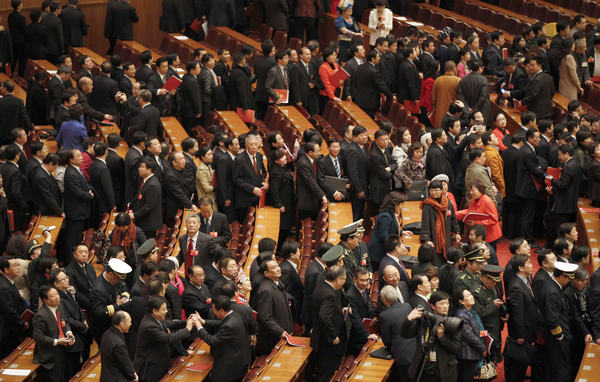Judges will question condemned criminals
Updated: 2012-03-15 07:36
By Zhao Yinan (China Daily)
|
||||||||
Experts say move shows progress in curbing number of death sentences
A long-awaited amendment will make interrogating criminals a "must" for judges when they review a death penalty sentence, a step forward in tightening the use of capital punishment and protecting criminals' rights.
The Amendment to the Criminal Procedure Law, passed by the National People's Congress on Wednesday, made the latest change in a final draft submitted to top lawmakers for a vote.
|
 |
|
Deputies leave after the closing session of the National People's Congress in the Great Hall of the People in Beijing on Wednesday. [Vincent Thian / Associated Press] |
As of next year, the new clause requires judges from the Supreme People's Court to interrogate offenders sentenced to death and listen to defendants' lawyers when a capital punishment case is under review.
Judges also have to reach an explicit ruling on whether or not to approve the death sentence. For sentences being refuted by the court, judges should either commute the sentence or send the case back to the court of first instance for retrial.
Experts said the refinement marks more progress in curbing the number of death sentences being carried out as well as improving judicial justice.
China commuted death sentences for 13 non-violent crimes in 2010 after the top court took back its power four years earlier to review all death sentences handed down by local courts. The top court's final say is the last judicial procedure in China before a criminal could be executed.
Dai Yuzhong, a deputy of the internal and judicial affairs committee of the National People's Congress, said the requirement is one of the many changes reflecting the protection of human rights, the most-highlighted reform in the amendment.
"Interrogating criminals can improve the accuracy of judicial rulings in death penalty cases, and it is a reflection of the country's policy of hampering crime with justice," he said.
As for the cost and human resources that the latest reform will require, Chen Guangzhong, a leading expert on justice procedures, admitted that carrying out the new policy could be difficult, considering China's large territory and rising number of criminal cases.
But it is possible to accomplish the mission with the assistance of high technology, such as interrogating criminals online, he said.
The amendment will be put into force on Jan 1.
Chen said the revision is a "long-awaited" one, after being first listed in the legislature's agenda in 2003.
Other highlights in the changes include outlawing forced confessions and the exclusion of evidence extracted through illegal means such as torture.
Contact the writer at zhaoyinan@chinadaily.com.cn

 Relief reaches isolated village
Relief reaches isolated village
 Rainfall poses new threats to quake-hit region
Rainfall poses new threats to quake-hit region
 Funerals begin for Boston bombing victims
Funerals begin for Boston bombing victims
 Quake takeaway from China's Air Force
Quake takeaway from China's Air Force
 Obama celebrates young inventors at science fair
Obama celebrates young inventors at science fair
 Earth Day marked around the world
Earth Day marked around the world
 Volunteer team helping students find sense of normalcy
Volunteer team helping students find sense of normalcy
 Ethnic groups quick to join rescue efforts
Ethnic groups quick to join rescue efforts
Most Viewed
Editor's Picks

|

|

|

|

|

|
Today's Top News
Health new priority for quake zone
Xi meets US top military officer
Japan's boats driven out of Diaoyu
China mulls online shopping legislation
Bird flu death toll rises to 22
Putin appoints new ambassador to China
Japanese ships blocked from Diaoyu Islands
Inspired by Guan, more Chinese pick up golf
US Weekly

|

|







